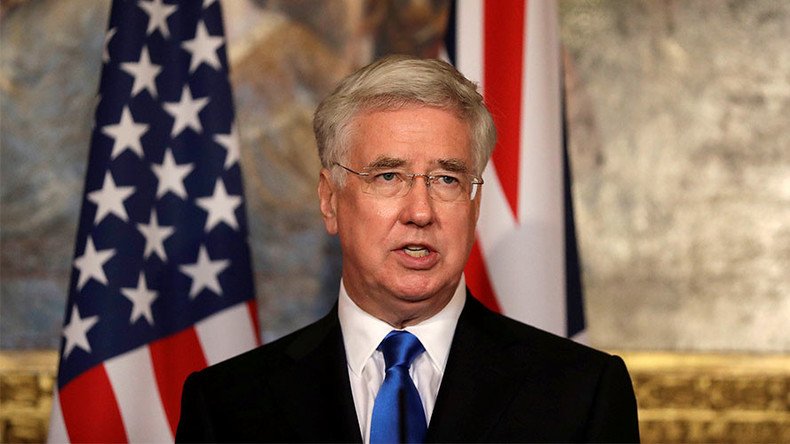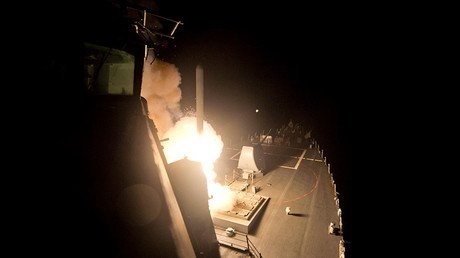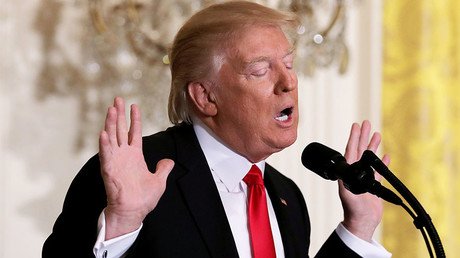UK govt ‘fully supports’ US missile strike on Syria

The British government says it “fully supports” the US missile strike against an airbase in Syria in response to an alleged chemical weapons attack.
The barrage of 59 Tomahawk missiles, fired from two US Navy vessels in the Mediterranean Sea, hit the Al Shayrat base near Homs in the early hours of Friday. It is claimed the base was responsible for launching a chemical attack on Tuesday, which reportedly killed up to 100 civilians in Idlib province.
British Defense Secretary Michael Fallon said the strike was intended to “deter” Syrian President Bashar Assad from carrying out chemical weapons attacks, but does not represent the start of a new military campaign, according to ITV.
He said the UK had been in “close contact” with the US over the last few days and the PM had been “informed throughout.” He said Britain had not been asked to play a role.
Fallon praised the US’s “very limited and appropriate action to deter the regime” in Syria from using gas in an “appalling way.” The message from Washington was that US President Donald Trump would retaliate against any further chemical attacks, Fallon said.
“We fully support this strike, we’ve been in close contact with the American government over the last couple of days in preparation for this,” Fallon told the BBC.
“The Americans believe they’ve exhausted all possible diplomatic and peaceful ways of dealing with the use by the regime of chemical weapons and they have been determined to try and prevent future attacks like this so they’ve taken this action today.”
He said Russia should “learn” from the strike and use its influence over Assad to “bring this slaughter to a halt.”
“The people who could stop it are not ourselves but in the end it is Russia who has the influence over the regime and could bring this war to a halt if it chose to do so, and I hope Russia will learn from what happened last night and use its influence against Assad to bring this slaughter to a halt.”
When asked why Britain would not intervene militarily in Syria, Fallon said: “Our parliament considered that before, back in 2013, and turned it down but we are involved in trying to get a political settlement in Syria and we will all be working harder to do that now.
“This civil war has gone on far too long.”
Crispin Blunt, the chair of the foreign affairs select committee, told the BBC that MPs may not block such an intervention in future, as long as the aim was clear and the action limited.
Blunt said it is essential the regime knows the US will launch similar assaults in future if chemical attacks are carried out again.
Labour leader Jeremy Corbyn criticized the US’s “unilateral military action without legal authorization.” He has told the British government to “urge restraint” on the Trump administration.
In a statement, he said: “The US missile attack on a Syrian government air base risks escalating the war in Syria still further.
“Tuesday’s horrific chemical attack was a war crime which requires urgent UN investigation and those responsible must be held to account.
“But unilateral military action without legal authorization or independent verification risks intensifying a multi-sided conflict that has already killed hundreds and thousands of people.
“What is needed instead is to urgently reconvene the Geneva peace talks and unrelenting international pressure for a negotiated settlement of the conflict.
“The terrible suffering of the Syrian people must be brought to an end as soon as possible and every intervention must be judged on what contribution it makes to that outcome.
“The British government should urge restraint on the Trump administration and throw its weight behind peace negotiations and a comprehensive political settlement.”
My statement on the US missile attack on a Syrian government air base. pic.twitter.com/wGZkCK6Y54
— Jeremy Corbyn MP (@jeremycorbyn) April 7, 2017
Labour Party deputy leader Tom Watson has backed the strike. He said it was a “direct and proportionate response” to alleged chemical attacks.
“Indiscriminate chemical weapons attacks on civilians can never be tolerated and must have consequences,” he told the Birmingham Mail.
The leader of the Liberal Democrat, Tim Farron, has also backed the US airstrikes in a piece for the Guardian.
He wrote: “I am in no doubt that what will end the war in Syria is what ultimately ends every conflict: words and diplomacy, not weapons.
“But when diplomacy fails and civilians suffer, as they have been doing for many years in Syria, and when they are the victims of weapons that have been outlawed by the international community for their horrific and indiscriminate consequences, then we cannot shy away from proportionate military intervention.”
The Stop the War Coalition, however, has condemned the “utterly irresponsible” missile strike. In a statement, a spokesperson said the action will “only increase the level of killing in Syria, and inflame the terrible war that has already caused untold misery for the people of the country.”
It says the action “threatens to widen the war and lead the West into military confrontation with Russia.”
“It is shameful that Theresa May has rushed to support this act by the most xenophobic and reactionary US president in history.”
Trump announced his strike in a televised message to the public. He called on “all civilized nations” to join his effort in “seeking to end the slaughter and bloodshed in Syria.” He branded Assad a “dictator” who had “launched a horrible chemical weapons attack on innocent civilians.”
Damascus has denied responsibility for the chemical attack. Russian officials say the gas contamination was the result of a leak from a rebel chemical weapons depot hit by Syrian government airstrikes.
The US, UK and France brought a resolution before the United Nations Security Council this week, demanding an investigation.
Downing Street on Wednesday played down the prospect of military action, insisting “nobody is talking” about an armed response.














